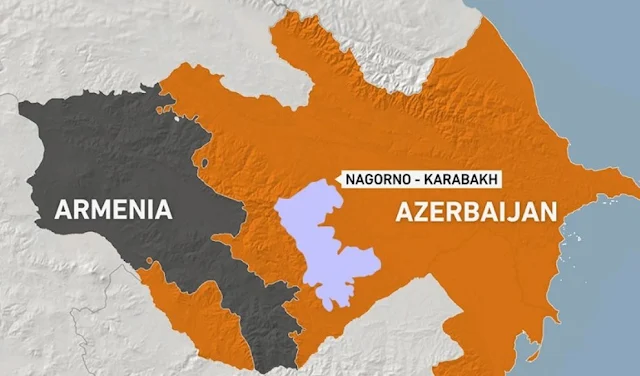 |
| a map showing the territories of the states of Azerbaijan and Armenia |
Moskow - The Russian-led Collective Security Treaty Organization (CSTO) announced it would send a mission to Armenia to report on the situation in the southern Caucasus and propose solutions to tensions with Azerbaijan. The mission will be led by CSTO Secretary General Stanislav Zas of Belarus and will include Russian General Anatoly Sidorov, the bloc's joint chief of staff.
The decision was made at the bloc's Security Council videoconference, hosted by Armenia, which currently chairs the CSTO. Armenian Prime Minister Nikol Pashinyan informed allies about overnight border clashes with Azerbaijan. According to the defense ministries in Yerevan and Baku at least 49 Armenians and 50 Azerbaijanis were killed in the fighting, which involved heavy artillery and drones.
Russian President Vladimir Putin briefed his allies about the practical steps Moscow has taken to reduce tensions on the Armenia-Azerbaijan border. "The CSTO supports the resolution of the Armenia-Azerbaijan conflict exclusively through political and diplomatic means based on generally recognized principles of international law and a Russian-mediated ceasefire in November 2020," the organization said. /2022).
Moscow has brokered an end to the 44-day conflict, in which Azerbaijan retook most of Nagorno Karabakh, a largely ethnic Armenian region that broke away from Baku in the 1990s.
While the remaining part of Nagorno Karabakh has been patrolled by Russian peacekeepers and has been relatively peaceful since then. Azerbaijan in August demanded that Armenia completely "demilitarize" the area and threatened a military operation if that did not happen.
Armenia had filed a complaint with the CSTO after Tuesday's clashes began, but it is not known whether Yerevan has officially used Article 4, which treats an attack on one member as an attack on all.
The bloc, founded in 1994, also includes Russia, Belarus, Kazakhstan, Kyrgyzstan and Tajikistan. Azerbaijan, Georgia and Uzbekistan were listed as members until 1999 but later withdrew, with Baku and Tbilisi seeking ties with NATO instead. Tashkent rejoined in 2006 only to later leave in 2012.
